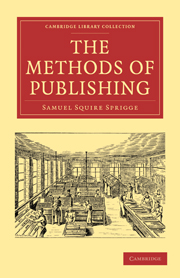Book contents
- Frontmatter
- Contents
- THE SOCIETY OF AUTHORS (INCORPORATED)
- PREFACE
- CHAPTER I LITERARY PROPERTY
- CHAPTER II THE VALUE OF ITS DIFFERENT FORMS
- CHAPTER III SALE, OUT-RIGHT AND LIMITED
- CHAPTER IV THE HALF-PROFIT SYSTEM
- CHAPTER V THE ROYALTY SYSTEM
- CHAPTER VI PUBLISHING ON COMMISSION
- CHAPTER VII ADVERTISEMENT
- CHAPTER VIII AUTHOR'S CORRECTIONS
- CHAPTER IX AGREEMENTS, MORE OR LESS
- CHAPTER X REMAINDER-SALES
- CHAPTER XI CONCLUDING REMARKS
- APPENDIX: THE SOCIETY OF AUTHORS. (INCORPORATED.)
- CONDITIONS OF MEMBERSHIP
CHAPTER IX - AGREEMENTS, MORE OR LESS
Published online by Cambridge University Press: 29 August 2010
- Frontmatter
- Contents
- THE SOCIETY OF AUTHORS (INCORPORATED)
- PREFACE
- CHAPTER I LITERARY PROPERTY
- CHAPTER II THE VALUE OF ITS DIFFERENT FORMS
- CHAPTER III SALE, OUT-RIGHT AND LIMITED
- CHAPTER IV THE HALF-PROFIT SYSTEM
- CHAPTER V THE ROYALTY SYSTEM
- CHAPTER VI PUBLISHING ON COMMISSION
- CHAPTER VII ADVERTISEMENT
- CHAPTER VIII AUTHOR'S CORRECTIONS
- CHAPTER IX AGREEMENTS, MORE OR LESS
- CHAPTER X REMAINDER-SALES
- CHAPTER XI CONCLUDING REMARKS
- APPENDIX: THE SOCIETY OF AUTHORS. (INCORPORATED.)
- CONDITIONS OF MEMBERSHIP
Summary
The details of the more ordinary forms of the contracts under which authors dispose of their property have now been discussed. But there are two ways in which the author, independently of detail, can go wholly wrong from the outset. One may be called the way of too much agreement—the other that of no agreement at all.
We will consider the latter first.
In every business transaction, save one between man and man, the experience of ages has caused it to be assumed, without offence being thereby given or thereat taken, that an agreement must be drawn up so as to give neither party any opportunity to overreach the other. When a man has a property to dispose of and when another is ready to purchase the same, each goes, as a matter of course, to a solicitor, or other independent adviser, and obtains, often at considerable cost, all the protection against overreaching that can be derived from skilled counsel.
This protection takes the form of a document, wherein is embodied, over mutual signature, the terms of the proposed transfer. To the clauses of this document each of the contracting parties can be bound tightly down, neither therefore signs it without due consideration and expert advice.
Even the possessor of a five-shilling share in a Capel Court bubble has some documentary protection, for promoters are, at any rate in modern times, required to justify their prospectus more or less by their works.
In publishing transactions alone, where the interests represented may amount to many thousands, and the returns from a single book may be a substantial income, there are often no agreements.
- Type
- Chapter
- Information
- The Methods of Publishing , pp. 96 - 101Publisher: Cambridge University PressPrint publication year: 2010First published in: 1890

